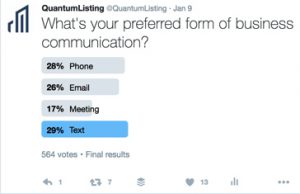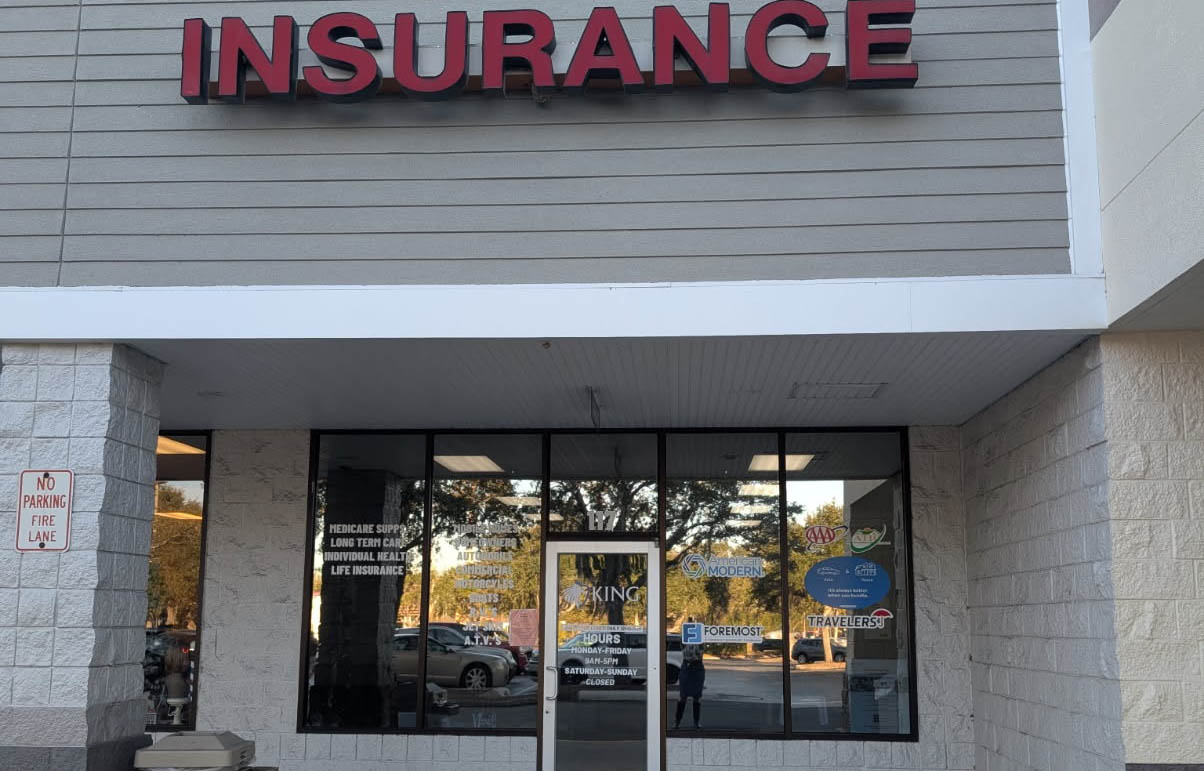What’s your preferred form of business communication? - by David Perlmutter
In commercial real estate, good communication is how deals get done. This month, QuantumListing.com conducted a one question Twitter poll asking, “What’s your preferred form of business communication?” We were able to get some surprising results. We had 564 respondents, so the sample size is large enough to be meaningful. The preferred form of business communication is text with 29%, followed closely by phone with 28%, email with 26% and meetings at 17%.
What I find most intriguing about these results is the winner is the newest form of communication that was offered as a choice. Most people send and receive their texts from their smartphone. It is short and direct. Correspondents don’t need to communicate in full sentences, and can even use abbreviations and emoji to help convey meaning. Text message can be sent from anywhere there is a wi-fi or phone signal. Additionally, it is easy to have a back and forth “conversation” and also to include multiple correspondents. As a Baby Boomer, text messages are not my preferred form of business communication, but I can see the appeal, and it is the Millennial generation and those even younger that are driving this trend. Text messaging keeps getting more versatile, with new features being added.
Phone calls were a close second to text messaging. Most people have a smart phone on them at all times and voicemail in case they can’t pick up, so you can reach most people anywhere and anytime. We have crystal clear landlines and usually decent cellular service in most places, so it is really a terrific way to communicate. You can get an immediate response if the person picks up, and you can also get a sense of emotion from listening closely that is often lacking in text and email.
Email has become both blessing and a curse. On the plus side, you can send documents, photos, PDFs and videos. On the negative side, there’s just too much of it! On weekdays, I get hundreds of emails. It’s gotten to the point that I’ve started using a service with artificial intelligence to help filter out the less important emails and the outright spam. I can “teach” it what I want to see immediately, what I want to quickly go through, and what I never want to see. This has made my inbox much more manageable than it was a year ago.
Even though meetings only got 17% of the vote, it seems to me that they are an underrated form of communication. As a broker, meeting a new customer helps cement the relationship, taking them on site tours is an indispensable way to move a deal forward, and face to face negotiations with landlords usually are a great way to finish up a deal. I understand that in some offices, there are weekly sales meetings or other meetings that seem like they are there to fill up the schedule rather than to accomplish something concrete, which may be why they are at the bottom in our poll.
It will be interesting to see how communication continues to evolve over the next decade. Twitter limits the possible poll answer choices to four, so the choices we gave were based on what I use most. As time passes, will apps like Facebook Messenger, Slack, WhatsApp or HouseParty become more important than they are now? Or maybe video conferencing will become more mainstream as technology and bandwidth become more available. It’s a safe bet that new forms of business communication will continue to emerge and be adopted by the rising generations.
David Perlmutter is the founder and CEO of QuantumListing/Perlmutter Properties, White Plains, N.Y.
Delisle and Monahan of Island Associates lease 45,000 s/f to Giunta’s Meat Farms at Strathmore Commons


Strategic pause - by Shallini Mehra and Chirag Doshi

Lasting effects of eminent domain on commercial development - by Sebastian Jablonski

Behind the post: Why reels, stories, and shorts work for CRE (and how to use them) - by Kimberly Zar Bloorian











.jpg)

.gif)